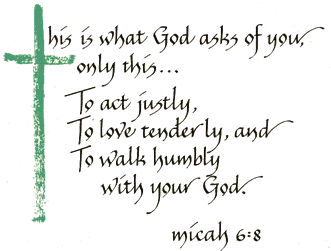catholicPittsburgh.org is the place for information, news, commentary, reflections and community building among the people of God who are renewing the Catholic Church in Western Pennsylvania.
More about us
Welcome ...
Partnering Groups
The following organizations are partners with catholicPittsburgh.org:
A Brief Reflection on Excommunication
A Brief Reflection on Excommunication
By John Houk
The head stone on the grave of Fr. Leonard Feeney, S.J. in Still River, Massachusetts, contains the inscription, “Extra ecclesiam nulla salus,” no salvation outside the Church. Feeney was excommunicated for preaching and teaching this dogma of our Church. This curious and sad story leads me to one conclusion. The reasons for our Church’s most serious punishment (since burning at the stake is no longer permitted) is historically conditioned, and Fr. Feeney lived in the wrong century.
For at least a thousand years, and confirmed again in the documents of the Council of Florence in the 15th century, the Catholic Church taught the literal truth of “extra ecclesiam nulla salus.” Francis A. Sullivan, S.J. in his book, Salvation Outside the Church?, puts forth the possibility that discovery of whole continents of people who had not heard the Good News of Jesus Christ led to a slow reinterpretation of this teaching which continues today.
In the 1940’s when Leonard Feeney went to battle with the Church over his literal interpretation, which the Church was already abandoning, he failed to recognize the historical conditioning of how dogmas of the Church are interpreted and presented. Secondly, he apparently did not recognize the hierarchy of principles (truths) that exists within the teaching of the Church. In both cases, historical and hierarchical, Feeney was not alone then, and isn’t alone today in the way many Catholics understand and internalize Church teaching.
Feeney’s formative years corresponded to my own father’s, the 20’s and 30’s. In that time and in this country excommunication was historically conditioned by the defensive posture of a persecuted immigrant Church. Excommunication hung over the head of anyone who married outside the Church, which my father did, and he spent his adult life standing in the back of the Church not even daring to take a seat let alone present himself for communion. Attending a friend’s wedding in a Protestant Church, and divorce and remarriage were reasons for automatic excommunication (a rule of the U. S. Bishops that they have since rescinded.)
John XXIII in his opening address to the Second Vatican Council noted the following: “The substance of the ancient doctrine of the deposit of the faith is one thing, and the way it is presented is another.” He was explicitly recognizing the “historical conditioning” which inevitably affects the way Church teaching has been expressed. The Council went on to radically and historically reinterpret “no salvation outside the Church” by recognizing the primary truth that God wills the salvation of every human being. The role of the Catholic Church in the “economy of salvation” must then be interpreted in light of this primary truth. The Church’s role is not diminished, but placed in hierarchical and historical context. Just as important, people “outside” the Church were now presumed innocent instead of being presumed guilty.
Quoting the Catholic Encyclopedia “Of itself excommunication says nothing concerning the moral standing of a given person before God.” (As we have noted, Leonard Feeney would have had a serious problem with this statement.) Excommunication is used to preserve order within the Church community. It is revocable (Fr. Feeney was later reconciled with the Church, and my father had a Catholic funeral), and bishops and popes have done much to leave the door of reconciliation open. We have seen just recently Pope Benedict XVI meet with the followers of the ultraconservative bishop, Marcel Lefebvre, who had all been excommunicated. (Lefebvre’s issue is essentially the same as Feeney’s.)
Excommunication no longer condemns a person to hell, but persons who are excommunicated are not allowed to receive or administer the sacraments, and they are not allowed to discharge any ecclesiastical office or function. As you can imagine enforcement, especially when large groups of people are involved, is problematic.
In very recent times groups have been excommunicated by bishops because they refused to turn over parish finances to the current bishop when they were given to them by previous bishops. Other groups have been excommunicated because they espoused changes in Church discipline when these groups even included other bishops. Today the application of this penalty is in disarray, and unless you are a priest, religious or employed by the Church (because you would lose your ministry, pension, health insurance, and employment not just access to the sacraments) this penalty no longer has the teeth it once had. Yet it can be a gut wrenching experience for Catholics who place a high value on receiving the sacraments.
Agents of change within the Church (and the Church teaches that it is always in need of renewal) risk this penalty from bishops who choose the path of coercion when they have failed to convince. Perhaps they should be reminded that canon law is hesitant about the infliction of all penalties. A principle of canon law is that rules are to be interpreted in the broad sense, and penalties in the narrow sense. Modern Catholics deserve involvement, dialogue, and a Church willing to live with its own basic principles especially those that acknowledge the historical and hierarchical context for its teachings. Today the heavy- handed use of penalties is almost certainly counter-productive and very likely to put bishops who use them on the wrong side of history yet again.
- By JoanHouk at Aug 7 2006 - 4:38pm
- Articles
Micah 6:8

©1996 Cards by Anne
Used with permission